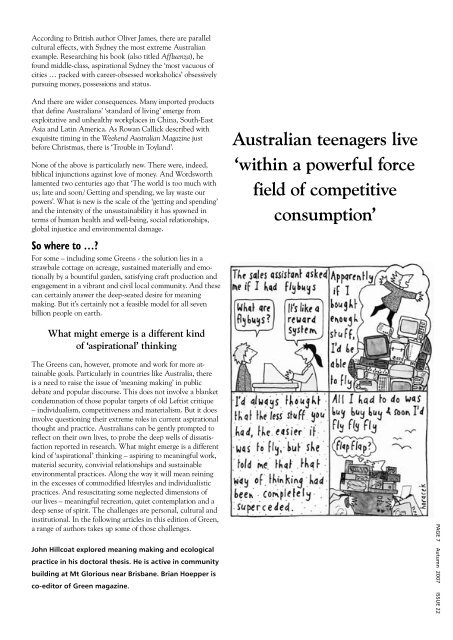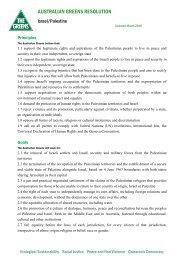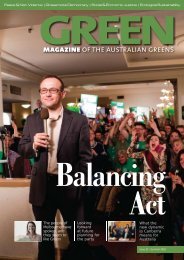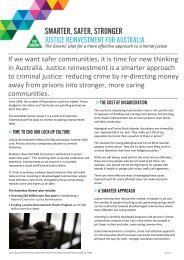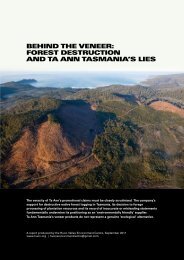news & views - Australian Greens
news & views - Australian Greens
news & views - Australian Greens
You also want an ePaper? Increase the reach of your titles
YUMPU automatically turns print PDFs into web optimized ePapers that Google loves.
According to British author Oliver James, there are parallel<br />
cultural effects, with Sydney the most extreme <strong>Australian</strong><br />
example. Researching his book (also titled Affluenza), he<br />
found middle-class, aspirational Sydney the ‘most vacuous of<br />
cities … packed with career-obsessed workaholics’ obsessively<br />
pursuing money, possessions and status.<br />
And there are wider consequences. Many imported products<br />
that define <strong>Australian</strong>s’ ‘standard of living’ emerge from<br />
exploitative and unhealthy workplaces in China, South-East<br />
Asia and Latin America. As Rowan Callick described with<br />
exquisite timing in the Weekend <strong>Australian</strong> Magazine just<br />
before Christmas, there is ‘Trouble in Toyland’.<br />
None of the above is particularly new. There were, indeed,<br />
biblical injunctions against love of money. And Wordsworth<br />
lamented two centuries ago that ‘The world is too much with<br />
us; late and soon/ Getting and spending, we lay waste our<br />
powers’. What is new is the scale of the ‘getting and spending’<br />
and the intensity of the unsustainability it has spawned in<br />
terms of human health and well-being, social relationships,<br />
global injustice and environmental damage.<br />
So where to …?<br />
For some – including some <strong>Greens</strong> - the solution lies in a<br />
strawbale cottage on acreage, sustained materially and emotionally<br />
by a bountiful garden, satisfying craft production and<br />
engagement in a vibrant and civil local community. And these<br />
can certainly answer the deep-seated desire for meaning<br />
making. But it’s certainly not a feasible model for all seven<br />
billion people on earth.<br />
What might emerge is a different kind<br />
of ‘aspirational’ thinking<br />
The <strong>Greens</strong> can, however, promote and work for more attainable<br />
goals. Particularly in countries like Australia, there<br />
is a need to raise the issue of ‘meaning making’ in public<br />
debate and popular discourse. This does not involve a blanket<br />
condemnation of those popular targets of old Leftist critique<br />
– individualism, competitiveness and materialism. But it does<br />
involve questioning their extreme roles in current aspirational<br />
thought and practice. <strong>Australian</strong>s can be gently prompted to<br />
reflect on their own lives, to probe the deep wells of dissatisfaction<br />
reported in research. What might emerge is a different<br />
kind of ‘aspirational’ thinking – aspiring to meaningful work,<br />
material security, convivial relationships and sustainable<br />
environmental practices. Along the way it will mean reining<br />
in the excesses of commodified lifestyles and individualistic<br />
practices. And resuscitating some neglected dimensions of<br />
our lives – meaningful recreation, quiet contemplation and a<br />
deep sense of spirit. The challenges are personal, cultural and<br />
institutional. In the following articles in this edition of Green,<br />
a range of authors takes up some of those challenges.<br />
John Hillcoat explored meaning making and ecological<br />
practice in his doctoral thesis. He is active in community<br />
building at Mt Glorious near Brisbane. Brian Hoepper is<br />
co-editor of Green magazine.<br />
<strong>Australian</strong> teenagers live<br />
‘within a powerful force<br />
field of competitive<br />
consumption’<br />
PAGE 7 Autumn 2007 ISSUE 22


